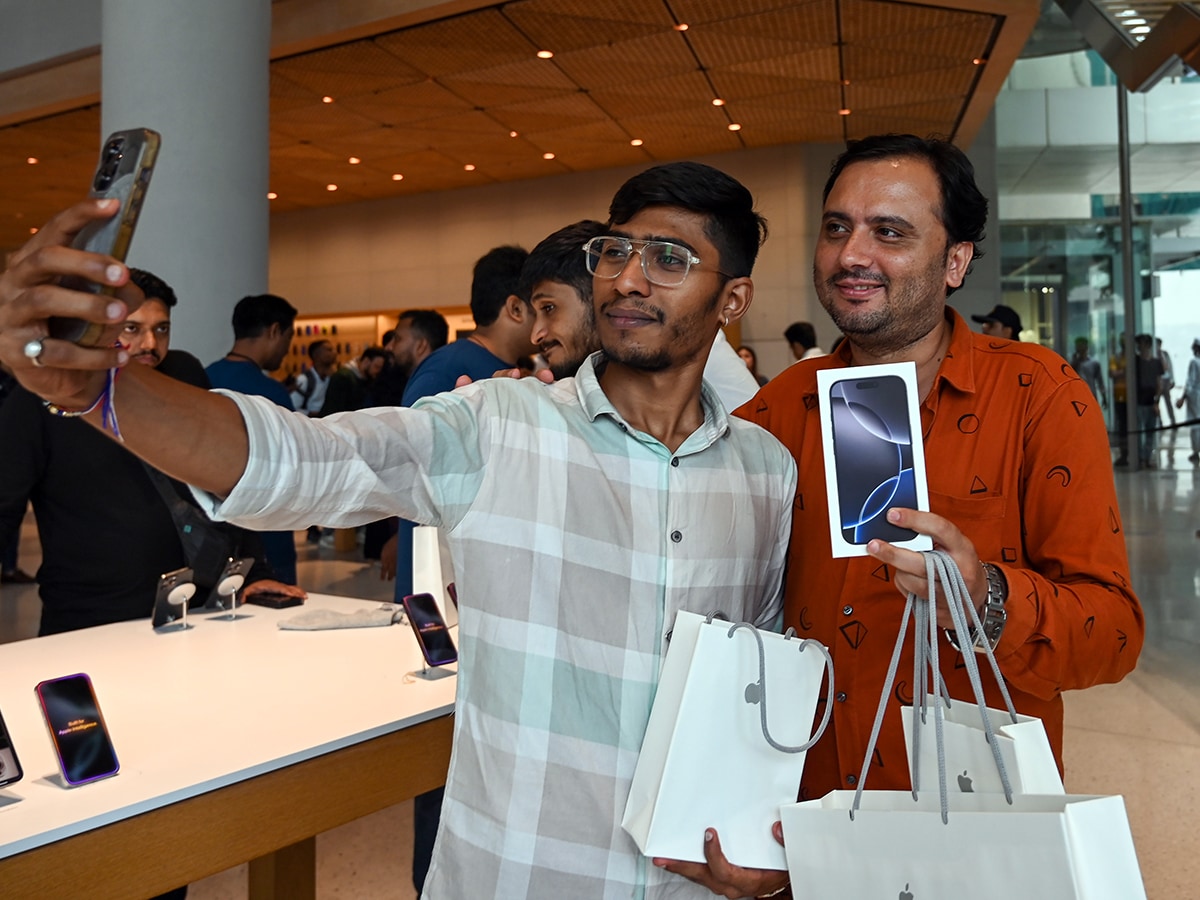 People take the selfie with the new IPhone 16 at the Apple store in Bandra-Kurla Complex during the first day of sale of the iPhone 16 smartphone on September 20, 2024 in Mumbai, India.
People take the selfie with the new IPhone 16 at the Apple store in Bandra-Kurla Complex during the first day of sale of the iPhone 16 smartphone on September 20, 2024 in Mumbai, India.
Image: Raju Shinde/Hindustan Times via Getty Images
Apple slows in China, plans four more own stores in India
Apple reported its fiscal fourth-quarter results on October 31, revealing a decline in sales in China, signalling potential market saturation amid rising competition from local brands such as Huawei and Xiaomi, as The Register noted. In the 12 months ended September 28 (Apple follows an October – September financial calendar), Greater China sales fell 7.7 percent from $72.5 billion in FY23 to $66.9 billion in FY24.
For Q4, sales in the region, Apple’s third-biggest market, was about $15 billion, falling only marginally by about $51 million. CEO Tim Cook, speaking to analysts in the earnings call last week, noted an all-time high in Apple’s active device base, with the company holding the top two smartphone sales in “urban China.”
Meanwhile, the iPhone maker continued to see strong sales in India, with another record quarter. Cook also said Apple plans to open four more stores in India. These will likely come up in Bengaluru, Pune, Delhi-NCR, apart from a second store in Mumbai, Moneycontrol reports. Apple opened its first company-owned retail stores in India in Mumbai and Delhi, in 2023.
India may reimpose laptop import curbs – S&P Global Market Intelligence
Government of India may reintroduce import limits on laptops in 2025, following a rollback in 2023, as part of a strategy to bolster domestic manufacturing, according to a press release from S&P Global’s Market Intelligence unit. India’s imports of computers rose 10.8 percent year-over-year in the three months ending August 31, 2024, largely driven by Apple shipments.
Enforcing the new rules will depend on industry response and the outcome of the upcoming US presidential election, according to S&P Global Market Intelligence.
Growth in India’s computer consumption is projected at 5.1 percent annually over the next five years, reinforcing the case for manufacturing investments. “India’s regulatory risks have fallen below its peers in recent years, making reshoring there more attractive,” the market researcher notes.
If assembly expands, imports of components may do so too, with mainland China and Hong Kong accounting for 40.1 percent and 17.4 percent, respectively, of imports of computer components (excluding semiconductors) in the 12 months to August 31, 2024. That may lead the government to incentivize reshoring of component manufacturing as well as assembly, according to the release.
Atos, struggling French IT services company, gets more govt help
Atos is getting more government help at home in France as the debt-ridden software company is struggling to turn itself around, Reuters reported on October 1. The French parliament’s Finance Commission said on Friday it had adopted an amendment that could even lead to nationalisation of Atos, one of Europe’s biggest IT services companies, according to Reuters.
The company’s survival is also seen as a strategic imperative as it secures communications for the French military and its supercomputers simulate nuclear bomb tests in France. Atos also provides critical IT services to Britain’s National Health Service, according to Reuters.
Enterprise AI – Only 2 pct have comprehensive readiness: Infosys
Senior business executives are “not certain their companies will achieve all that AI promises,” according to the results of a survey conducted by Infosys as part of its marketing efforts. In a poll of 1,500 companies worldwide and from interviews of more than 30 senior executives, the Indian IT services company finds leaders in these companies worry about the many risks AI poses to their company and to their careers.
Infosys’s report on its findings, Enterprise AI Readiness Radar, was published on the company’s website last week. The survey sought to determine if companies had the foundational building blocks in place and how culture and leadership mindsets influence AI adoption.
Only 2 percent were prepared across the five readiness dimensions Infosys defined, which were talent, strategy, governance, data, and technology. Preparedness was higher in specific areas: talent (35% of the companies surveyed), strategy (23%), governance (21%), data (17%), and technology (9%).
“Our research found that Enterprise AI, including generative AI, promises to unlock up to 40 percent in productivity gains,” Jeff Kavanaugh, head of Infosys Knowledge Institute, the company’s research unit that leads these surveys, said in the report.
HCLTech launches lab in Singapore for AI and cloud solutions
HCLTech has announced the establishment of a new lab in Singapore to develop AI and cloud solutions, set to open in 2025, according to a company press release on November 4. This will be the company’s fifth lab globally, after facilities in the US, UK, Germany, and India. Supported by the Singapore Economic Development Board (EDB), the lab aims to accelerate AI initiatives for enterprises through HCLTech’s suite of AI solutions.
Collaborating with Nanyang Polytechnic and Singapore Polytechnic, the lab will focus on knowledge transfer and talent development in AI. HCLTech’s Chairperson, Roshni Nadar Malhotra, emphasised the lab’s role in enhancing Singapore’s position as a regional hub for AI innovation, aligning with the country’s National AI Strategy 2.0, according to the release.
